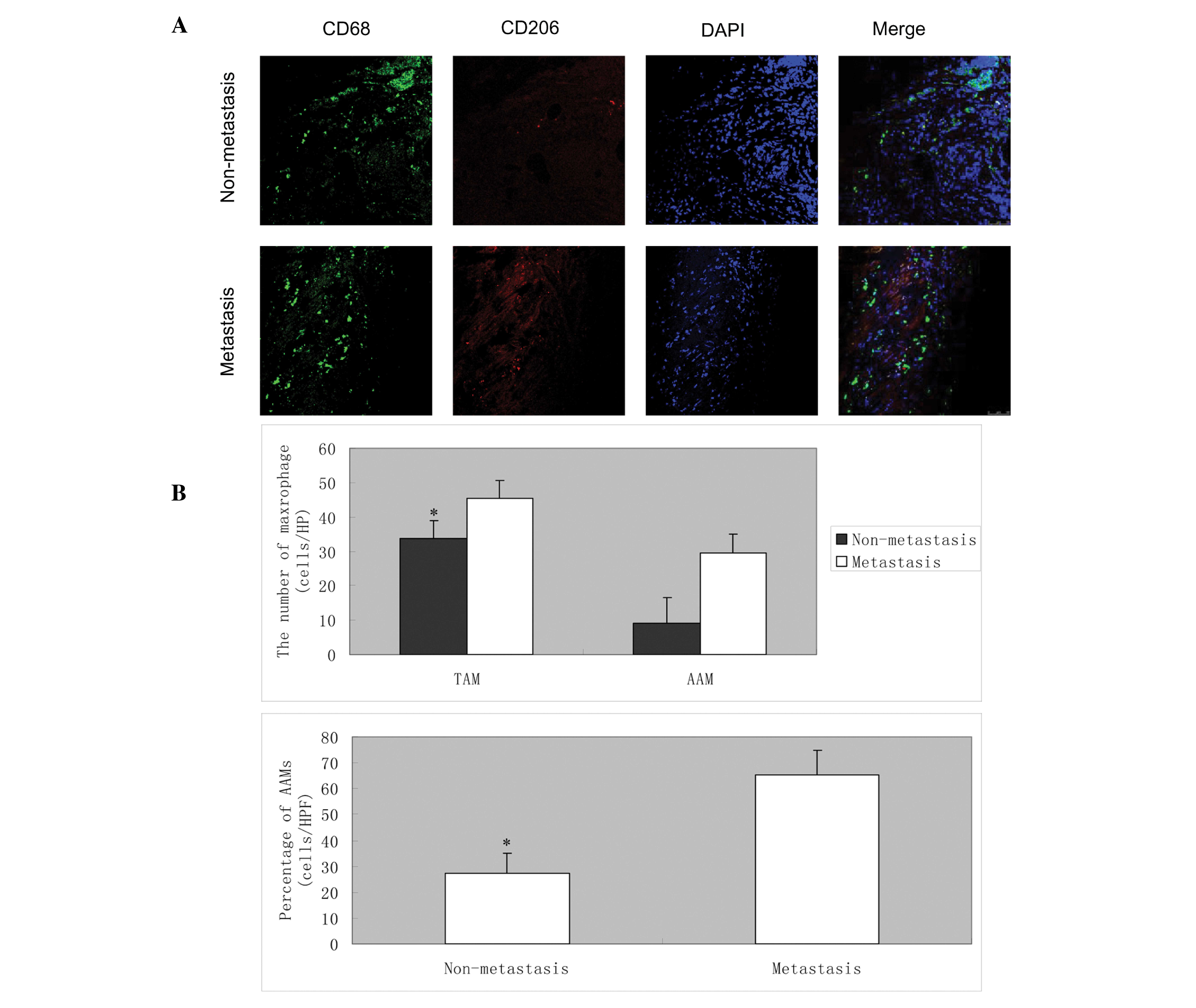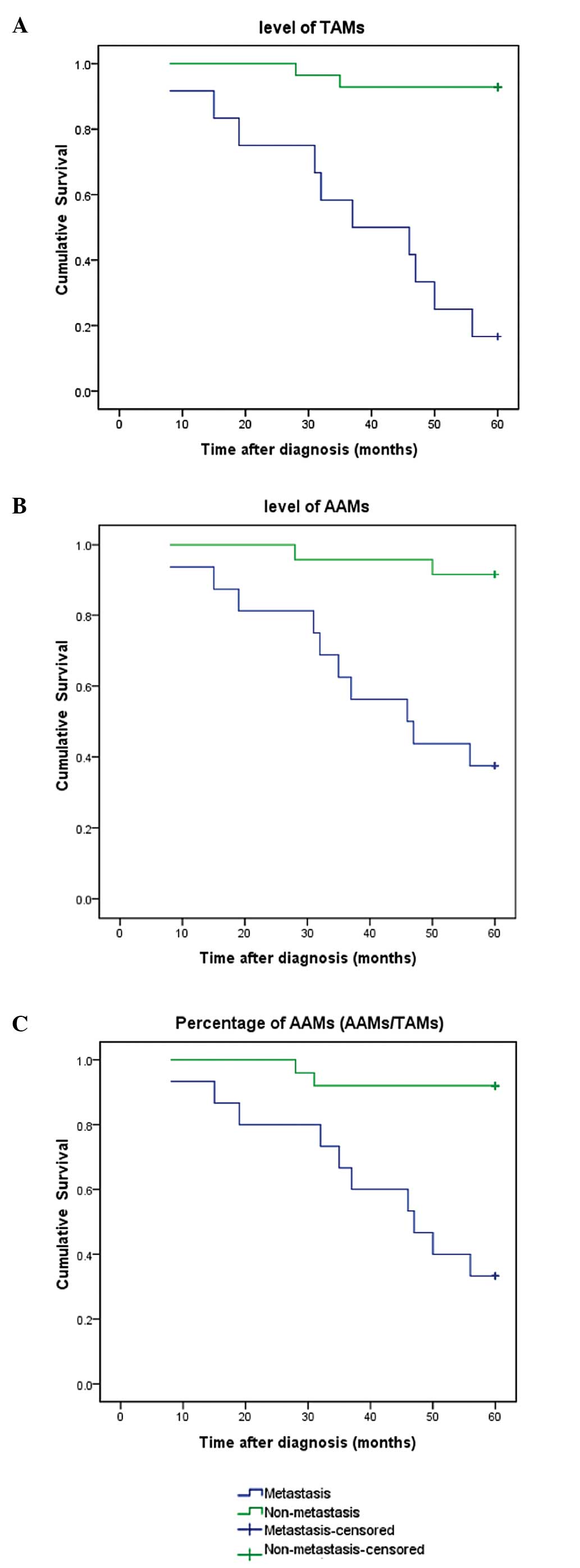|
1
|
Collin SM, Martin RM, Metcalfe C, et al:
Prostate-cancer mortality in the USA and UK in 1975–2004: An
ecological study. Lancet Oncol. 9:445–452. 2008. View Article : Google Scholar : PubMed/NCBI
|
|
2
|
Siegel R, Naishadham D and Jemal A: Cancer
statistics, 2013. CA Cancer J Clin. 63:11–30. 2013. View Article : Google Scholar : PubMed/NCBI
|
|
3
|
Han SJ, Zhang SW, Chen WQ and Li CL:
Analysis of status and trends of prostate cancer incidence in
China. Lin chuang Zhong Liu Xue Za Zhi. 18:330–335. 2013.
|
|
4
|
Tammela T: Endocrine treatment of prostate
cancer. J Steroid Biochem Mol Biol. 92:287–295. 2004. View Article : Google Scholar : PubMed/NCBI
|
|
5
|
Loblaw DA, Virgo KS, Nam R, et al:
American Society of Clinical Oncology : Initial hormonal management
of androgen-sensitive metastatic, recurrent, or progressive
prostate cancer: 2006 update of an American Society of Clinical
Oncology practice guideline. J Clin Oncol. 25:1596–1605. 2007.
View Article : Google Scholar : PubMed/NCBI
|
|
6
|
Phillips JG, Aizer AA, Chen MH, Zhang D,
Hirsch MS, Richie JP, Tempany CM, Williams S, Hegde JV, Loffredo MJ
and D'Amico AV: The effect of differing Gleason scores at biopsy on
the odds of upgrading and the risk of death from prostate cancer.
Clin Genitourin Cancer. 12:e181–187. 2014. View Article : Google Scholar : PubMed/NCBI
|
|
7
|
Mohammed AA: Biomarkers in prostate
cancer: New era and prospective. Med Oncol. 31:1402014. View Article : Google Scholar : PubMed/NCBI
|
|
8
|
Chiarugi P, Paoli P and Cirri P: Tumor
microenvironment and metabolism in prostate cancer. Semin Oncol.
41:267–280. 2014. View Article : Google Scholar : PubMed/NCBI
|
|
9
|
Gollapudi K, Galet C, Grogan T, et al:
Association between tumor-associated macrophage infiltration, high
grade prostate cancer and biochemical recurrence after radical
prostatectomy. Am J Cancer Res. 3:523–529. 2013.PubMed/NCBI
|
|
10
|
Schmieder A, Michel J, Schönhaar K, Goerdt
S and Schledzewski K: Differentiation and gene expression profile
of tumor-associated macrophages. Semin Cancer Biol. 22:289–297.
2012. View Article : Google Scholar : PubMed/NCBI
|
|
11
|
Solinas G, Schiarea S, Liguori M, et al:
Tumor-conditioned macrophages secrete migration-stimulating factor:
A new marker for M2-polarization, influencing tumor cell motility.
J Immunol. 185:642–652. 2010. View Article : Google Scholar : PubMed/NCBI
|
|
12
|
Su S, Liu Q, Chen J, et al: A positive
feedback loop between mesenchymal-like cancer cells and macrophages
is essential to breast cancer metastasis. Cancer Cell. 25:605–620.
2014. View Article : Google Scholar : PubMed/NCBI
|
|
13
|
Takayama H, Nishimura K, Tsujimura A, et
al: Increased infiltration of tumor associated macrophages is
associated with poor prognosis of bladder carcinoma in situ after
intravesical bacillus Calmette-Guerin instillation. J Urol.
181:1894–1900. 2009. View Article : Google Scholar : PubMed/NCBI
|
|
14
|
Zhou Q, Peng RQ, Wu XJ, et al: The density
of macrophages in the invasive front is inversely correlated to
liver metastasis in colon cancer. J Transl Med. 8:132010.
View Article : Google Scholar : PubMed/NCBI
|
|
15
|
Gordon S: Alternative activation of
macrophages. Nat Rev Immunol. 3:23–35. 2003. View Article : Google Scholar : PubMed/NCBI
|
|
16
|
Martinez FO, Sica A, Mantovani A and
Locati M: Macrophage activation and polarization. Front Biosci.
13:453–461. 2008. View
Article : Google Scholar : PubMed/NCBI
|
|
17
|
Badylak SF, Valentin JE, Ravindra AK, et
al: Macrophage phenotype as a determinant of biologic scaffold
remodeling. Tissue Eng Part A. 14:1835–1842. 2008. View Article : Google Scholar : PubMed/NCBI
|
|
18
|
Troidl C, Möllmann H, Nef H, et al:
Classically and alternatively activated macrophages contribute to
tissue remodelling after myocardial infarction. J Cell Mol Med.
13:3485–3496. 2009. View Article : Google Scholar : PubMed/NCBI
|
|
19
|
Lanciotti M, Masieri L, Raspollini MR, et
al: The role of M1 and M2 macrophages in prostate cancer in
relation to extracapsular tumor extension and biochemical
recurrence after radical prostatectomy. Biomed Res Int.
2014:4867982014. View Article : Google Scholar : PubMed/NCBI
|
|
20
|
Gollapudi K, Galet C, Grogan T, et al:
Association between tumor-associated macrophage infiltration, high
grade prostate cancer and biochemical recurrence after radical
prostatectomy. Am J Cancer Res. 3:523–529. 2013.PubMed/NCBI
|
|
21
|
Comito G, Giannoni E, Segura CP, et al:
Cancer-associated fibroblasts and M2-polarized macrophages
synergize during prostate carcinoma progression. Oncogene.
33:2423–2431. 2014. View Article : Google Scholar : PubMed/NCBI
|
|
22
|
Cheng L, Montironi R, Bostwick DG,
Lopez-Beltran A and Berney DM: Staging of prostate cancer.
Histopathology. 60:87–117. 2012. View Article : Google Scholar : PubMed/NCBI
|
|
23
|
Herroon MK, Rajagurubandara E, Rudy DL, et
al: Macrophage cathepsin K promotes prostate tumor progression in
bone. Oncogene. 32:1580–1593. 2013. View Article : Google Scholar : PubMed/NCBI
|
|
24
|
Murphy BS, Bush HM, Sundareshan V, et al:
Characterization of macrophage activation states in patients with
cystic fibrosis. J Cyst Fibros. 9:314–322. 2010. View Article : Google Scholar : PubMed/NCBI
|
|
25
|
Heymann F, Trautwein C and Tacke F:
Monocytes and macrophages as cellular targets in liver fibrosis.
Inflamm Allergy Drug Targets. 8:307–318. 2009. View Article : Google Scholar : PubMed/NCBI
|
|
26
|
Desguerre I, Mayer M, Leturcq F, et al:
Endomysial fibrosis in Duchenne muscular dystrophy: a marker of
poor outcome associated with macrophage alternative activation. J
Neuropathol Exp Neurol. 68:762–773. 2009. View Article : Google Scholar : PubMed/NCBI
|
|
27
|
Mathai SK, Gulati M, Peng X, et al:
Circulating monocytes from systemic sclerosis patients with
interstitial lung disease show an enhanced profibrotic phenotype.
Lab Invest. 90:812–823. 2010. View Article : Google Scholar : PubMed/NCBI
|
|
28
|
Higashi-Kuwata N, Jinnin M, Makino T, et
al: Characterization of monocyte/macrophage subsets in the skin and
peripheral blood derived from patients with systemic sclerosis.
Arthritis Res Ther. 12:R1282010. View
Article : Google Scholar : PubMed/NCBI
|
|
29
|
Huang SP, Bao BY, Wu MT, et al: Impact of
prostate-specific antigen (PSA) nadir and time to PSA nadir on
disease progression in prostate cancer treated with
androgen-deprivation therapy. Prostate. 71:1189–1197. 2011.
View Article : Google Scholar : PubMed/NCBI
|
|
30
|
Chen CH, Hsieh JT, Huang KH, Pu YS and
Chang HC: Predictive clinical indicators of biochemical progression
in advanced prostate cancer patients receiving Leuplin depot as
androgen deprivation therapy. PLoS One. 9:e1050912014. View Article : Google Scholar : PubMed/NCBI
|
|
31
|
Petrylak DP, Ankerst DP, Jiang CS, et al:
Evaluation of prostate-specific antigen declines for surrogacy in
patients treated on SWOG 99-16. J Natl Cancer Inst. 98:516–521.
2006. View Article : Google Scholar : PubMed/NCBI
|
|
32
|
Armstrong AJ, Garrett-Mayer E, Ou Yang YC,
et al: Prostate-specific antigen and pain surrogacy analysis in
metastatic hormone-refractory prostate cancer. J Clin Oncol.
25:3965–3970. 2007. View Article : Google Scholar : PubMed/NCBI
|
|
33
|
Partin AW, Kattan MW, Subong EN, et al:
Combination of prostate-specific antigen, clinical stage and
Gleason score to predict pathological stage of localized prostate
cancer. A multi-institutional update. JAMA. 277:1445–1451. 1997.
View Article : Google Scholar : PubMed/NCBI
|
|
34
|
D'Amico AV, Whittington R, Malkowicz SB,
et al: Biochemical outcome after radical prostatectomy, external
beam radiation therapy, or interstitial radiation therapy for
clinically localized prostate cancer. JAMA. 280:969–974. 1998.
View Article : Google Scholar : PubMed/NCBI
|
|
35
|
Crook J and Ots AF: Prognostic factors for
newly diagnosed prostate cancer and their role in treatment
selection. Semin Radiat Oncol. 23:165–172. 2013. View Article : Google Scholar : PubMed/NCBI
|
|
36
|
Phillips JG, Aizer AA, Chen MH, et al: The
effect of differing gleason scores at biopsy on the odds of
upgrading and the risk of death from prostate cancer. Clin
Genitourin Cancer. 12:e181–e187. 2014. View Article : Google Scholar : PubMed/NCBI
|
















